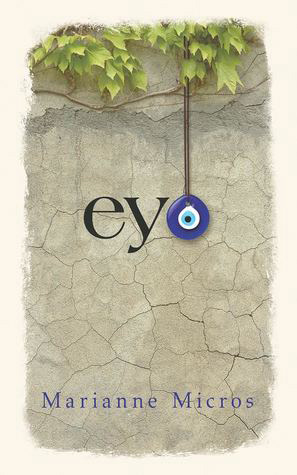As a long-time English professor at the University of Guelph, Marianne Micros taught folktales among other things, and this influence is clear in her short story collection Eye, recently published by Guernica Editions. Also evident is the influence of her Greek mother, to whom the book is dedicated.
For these are short stories that weave folktales and mythology together with contemporary life. We start with a young boy seeing visions of the future after discovering the head of Orpheus on a beach, and in later stories we meet Ariadne in a labyrinth, Io transformed into a cow, and others.

There are also non-Greek legends and folktales. One of my favourite stories was The Changeling’s Brother, inspired by an English folktale about changelings—fairy children secretly substituted for human ones. In Micros’s version, Johnnie comes home from war to discover that his younger brother Willy, whom he last saw 20 years ago, is still a baby. What’s worse, he is “not the cooing, giggling, chubby brother I remember but some creature with a withered old face and wrinkled body. Pale, then, whining.”
Johnnie’s mother refuses to accept that anything is wrong with her 20-year-old baby, insisting that “He’s just a weak one, Johnnie. He’s always been like this.” At first, it seems as if this will be a straightforward confrontation between Johnnie and his mother, until we discover that Johnnie’s own motives are more complicated, thanks to an experience he had in the woods when he was sixteen, being invited to dance by a fairy woman with long golden hair who has haunted his dreams ever since. The story’s conclusion involves another substitution, but not the one we might have expected. It’s a clever twist on an old tale, which is what you could say about the collection in general.
In the dedication for Eye, Micros discloses that her mother was “a natural healer, who know how to repel the evil eye.” These healers appear regularly in the stories, either as the main character or as subsidiary ones. They are midwives, healers, nurses, brewers of potions, givers of advice. The modern world is intruding on theirs—this is a central theme of the title story, Eye—but the traditional healers still play an important role. They are guardians of a heritage that, like the legends passed down for thousands of years, serves an important purpose that is not diminished by our recent delusion of scientific omniscience.
By setting most of these stories in the present day, Micros creates a sense of all these traditional legends still existing in our contemporary world whether we admit it or not, whether we notice them or not. I don’t want to say that she makes them relevant, because I don’t think that things needs to be recent to be relevant. But reading Eye by Marianne Micros is a satisfying and thought-provoking experience. You get a sense of the melding of different cultures and different eras in a new form.
If you want more folktales, read my review of West Indian Folk Tales. Or read this short post about the mythological origins of the term “halcyon days”.




There are 8 comments
This sounds really good. I think that updating folktales and mythology so that they work into modern stories can be tricky. It could end up as silly and trite it it can work well. Based on your commentary it sounds like it really works well here.
I also love the cover.
Hi Brian, You’re right, it can be tricky, and it doesn’t always work. I think there has to be a reason for doing it, and it needs to be done skilfully so that it brings something new to the story. For the most part, this collection brings it off well!
Definitely an alluring cover! I don’t know much about contemporary Greek literature, but the literature seems to have a history (and why not?) of retelling and reinvigorating old myths and legends. I’ll look for this one for sure.
Hi Scott, good to hear from you! There’s such a rich heritage of stories to draw on in Greek literature, isn’t there? I like the retelling and reinvigorating, which probably reflects how these stories were originally shape over centuries of oral transmission.
There is indeed, and I suppose if any one can lay a claim to retelling the Greek myths it’s the Greeks themselves. There’s another quite interesting modern Greek writer you might want to check out, especially since her most well known work got translated into English recently: Zyranna Zatéli. I read a few short selections from it in French translation several years ago and liked them a lot.
Thanks for the recommendation, Scott! It’s very timely, actually, since your previous comment got me thinking that I don’t know much about contemporary Greek literature either, and right now I’m staying in northern Greece (although we’re heading back to Bulgaria tomorrow). So I was looking for something Greek and contemporary to read, and then your comment popped up! It’s perfect. I’ll download it for my Kindle now! I assume you’re talking about “At Twilight They Return”, right?
Lovely, perceptive review, Andrew. You’d also love Madeline Miller’s Circe!
Thanks, Penn! I’ve heard about that novel and wondered if I’d like it, so I appreciate the recommendation. I’ll give it a try!